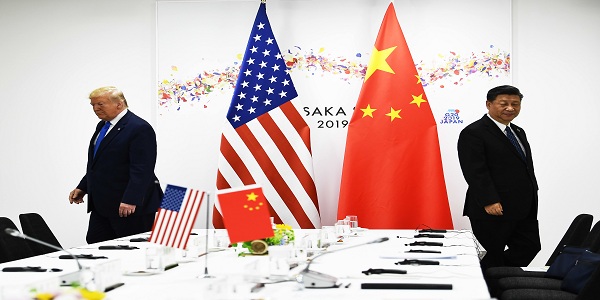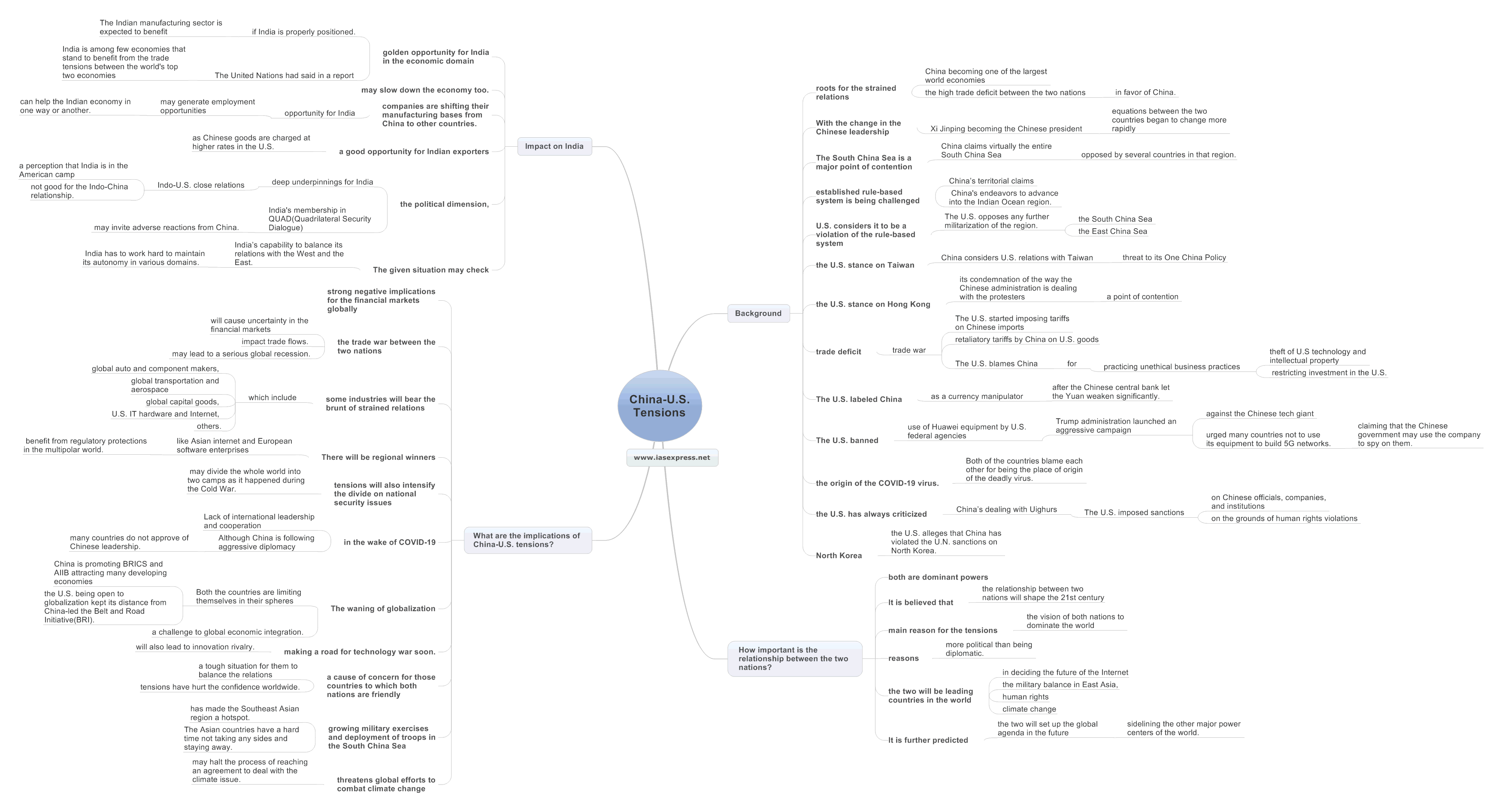China-U.S. Tensions – Implications for India and the World

From Current Affairs Notes for UPSC » Editorials & In-depths » This topic
IAS EXPRESS Vs UPSC Prelims 2024: 85+ questions reflected
As Joe Biden takes charge of the U.S. administration, all the eyes of the world are stuck at Biden’s actions on how he tackles China and mends the strained relations between the two nations. The tensions between the two nations have been a cause of concern for the whole world. The two countries have several issues acting as points of contention and these issues are aggravating the strain in the relation of the two nations further. Their tensions are halting many endeavors of the world community to find a solution to the burning global problems. The two countries are competing to be a global power and thus it cannot be considered anything other than a duel for global dominance. Hence, it becomes important to understand the implications of these strained relations in the short and long run and how India needs to play out in the given situation.
Background
- If one goes deep into the history of China-U.S. relations, it will be worthwhile to note that the roots for the strained relations lie in China becoming one of the largest world economies and the high trade deficit between the two nations in favor of China.
- With the change in the Chinese leadership and Xi Jinping becoming the Chinese president the equations between the two countries began to change more rapidly.
- The South China Sea is a major point of contention between the two nations. China claims virtually the entire South China Sea which is opposed by several countries in that region.
- The established rule-based system is being challenged by China’s territorial claims in the South China Sea and its various endeavors to advance into the Indian Ocean region.
- The U.S. considers it to be a violation of the established rule-based system as China is increasing its maritime activities in the South China Sea and the East China Sea. The U.S. opposes any further militarization of the region.
- Another point of contention is the U.S. stance on Taiwan. China considers U.S. relations with Taiwan as a threat to its One China Policy. Similarly, the U.S. stance on Hong Kong and its condemnation of the way the Chinese administration is dealing with the protesters is a point of contention between the two countries.
- The trade deficit has given rise to the trade war between the two countries. The U.S. started imposing tariffs on Chinese imports and retaliatory tariffs by China on U.S. goods strained the relations further. The U.S. blames China for practicing unethical business practices like theft of U.S technology and intellectual property and restricting investment in the U.S.
- The U.S. labeled China as a currency manipulator after the Chinese central bank let the Yuan weaken significantly.
- The U.S. banned the use of Huawei equipment by U.S. federal agencies. The Trump administration launched an aggressive campaign against the Chinese tech giant and urged many countries not to use its equipment to build 5G networks claiming that the Chinese government may use the company to spy on them.
- And the latest of these is the China-U.S. tensions over the origin of the COVID-19 virus. Both of the countries blame each other for being the place of origin of the deadly virus.
- Additionally, the U.S. has always criticized China’s dealing with Uighurs. The U.S. imposed sanctions on Chinese officials, companies, and institutions on the grounds of human rights violations of the minority community in the country’s western Xinjiang region.
- Last but not least, North Korea is one of the grounds of contention between the two countries. Although both of the countries want North Korea to give up its nuclear weapons, the U.S. alleges that China has violated the U.N. sanctions on North Korea.
How important is the relationship between the two nations?
The China-U.S. relationship is important as both are dominant powers in their respective regions. It is believed that the relationship between two nations will shape the 21st century. One of the main reasons for the tensions between them is believed to be the vision of both nations to dominate the world. The reasons are more political than being diplomatic. The two will be leading countries in the world in deciding the future of the Internet, the military balance in East Asia, human rights, and climate change. It is further predicted that the two will set up the global agenda in the future sidelining the other major power centers of the world.
What are the implications of China-U.S. tensions?
- It has strong negative implications for the financial markets globally. As the U.S. is the largest economy and China being the fastest-growing economy, the trade war between the two nations will cause uncertainty in the financial markets and impact trade flows. It is believed that these tensions, in the long run, may lead to a serious global recession.
- Some of the industries will bear the brunt of strained relations which include global auto and component makers, global transportation and aerospace, global capital goods, U.S. IT hardware and Internet, and others.
- There will be regional winners like Asian internet and European software enterprises which benefit from regulatory protections in the multipolar world.
- The tensions will also intensify the divide on national security issues. Many countries see the U.S. as a counterbalancing force against China and vice versa. This may divide the whole world into two camps as it happened during the Cold War.
- Lack of international leadership and cooperation in the wake of COVID-19 is another problem. Although China is following aggressive diplomacy, many countries do not approve of Chinese leadership.
- The waning of globalization is another issue. Both the countries are limiting themselves in their spheres. While China is promoting BRICS and AIIB attracting many developing economies, the U.S. being open to globalization kept its distance from China-led the Belt and Road Initiative(BRI). The tensions are a challenge to global economic integration.
- The tensions are making a road for technology war soon. These will also lead to innovation rivalry.
- The rising China-U.S. tensions are a cause of concern for those countries to which both nations are friendly. It will be a tough situation for them to balance the relations with both nations. The U.S-China tensions have hurt the confidence worldwide.
- Another implication of this situation is the growing military exercises and deployment of troops in the South China Sea. This has made the Southeast Asian region a hotspot. The Asian countries have a hard time not taking any sides and staying away.
- Furthermore, the rivalry between the two countries threatens global efforts to combat climate change. The two countries standing on two different ends may halt the process of reaching an agreement to deal with the climate issue.
Impact on India
- The China-U.S. tensions are a golden opportunity for India in the economic domain if India is properly positioned. The Indian manufacturing sector is expected to benefit from the tensions between these two countries. The United Nations had said in a report that India is among few economies that stand to benefit from the trade tensions between the world’s top two economies. However, if the tensions continue for too long, this may slow down the economy too.
- Many companies are shifting their manufacturing bases from China to other countries. This is an opportunity for India. If the companies choose to operate their manufacturing centers in India, this may generate employment opportunities for Indians and can help the Indian economy in one way or another.
- Similarly, the tensions may be a good opportunity for Indian exporters as Chinese goods are charged at higher rates in the U.S. However, this also depends on how the Indian currency is placed.
- In the political dimension, the tensions have deep underpinnings for India. Given Indo-U.S. close relations, there is a perception that India is in the American camp which is not good for the Indo-China relationship. India’s membership in the QUAD(Quadrilateral Security Dialogue) is another issue that may invite adverse reactions from China.
- The given situation may check India’s capability to balance its relations with the West and the East. India has to work hard to maintain its autonomy in various domains.
Way forward
The China-U.S. tensions tend to be one of the major threats the world is facing which have far-reaching ramifications for geopolitics. The rivalry between the two countries will not only divide the world into two camps but will create differences among nations leading to an anarchical situation. The tension may lead to an arms race and other adverse developments for the whole world. Hence, it is time that the global community takes measures to reduce the differences between two major powers and pave the way for peaceful coexistence.
Practise Question
Q.What are the implications of China-U.S. tensions for the whole world and how will these tensions impact India?
If you like this post, please share your feedback in the comments section below so that we will upload more posts like this.


